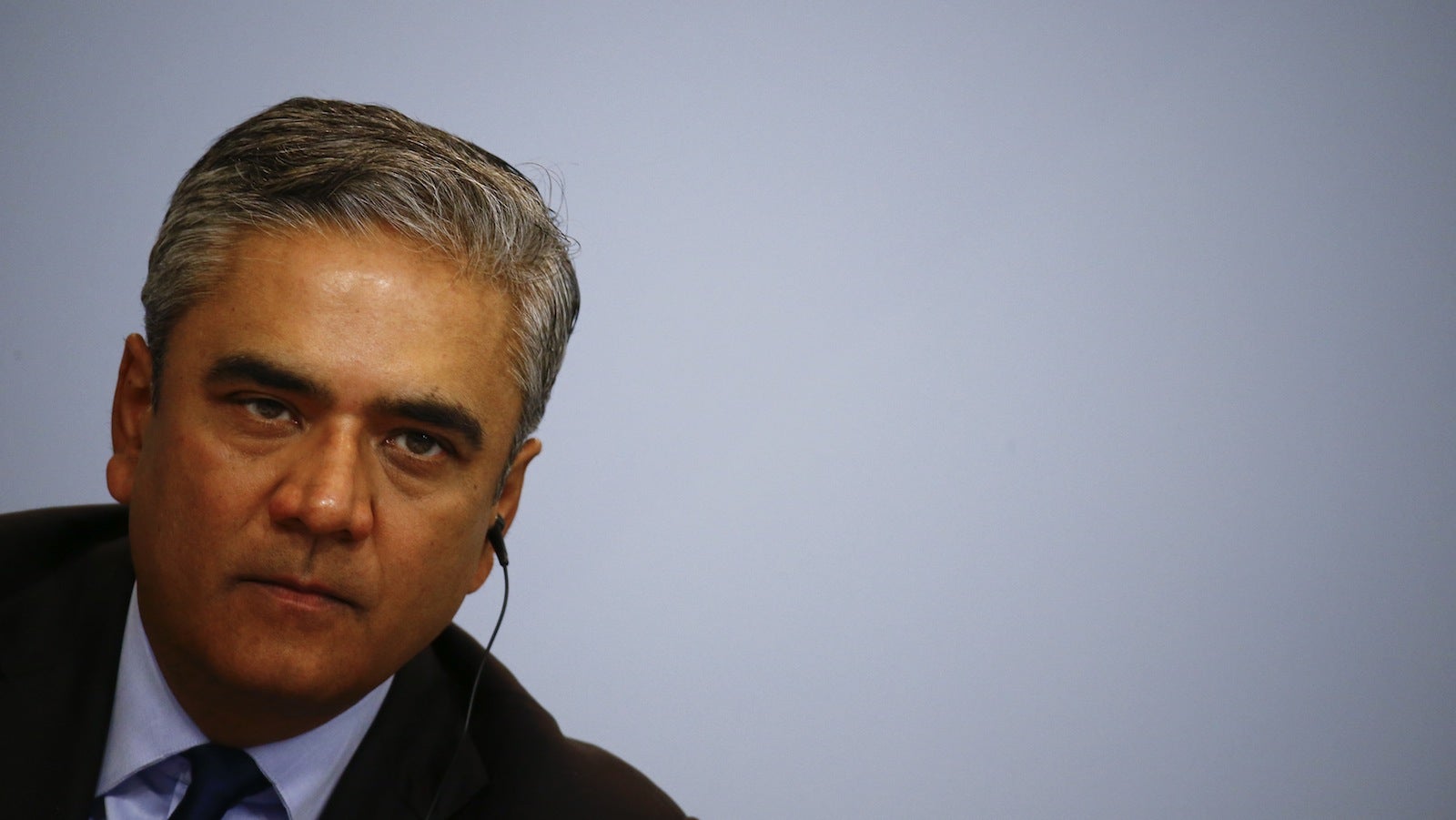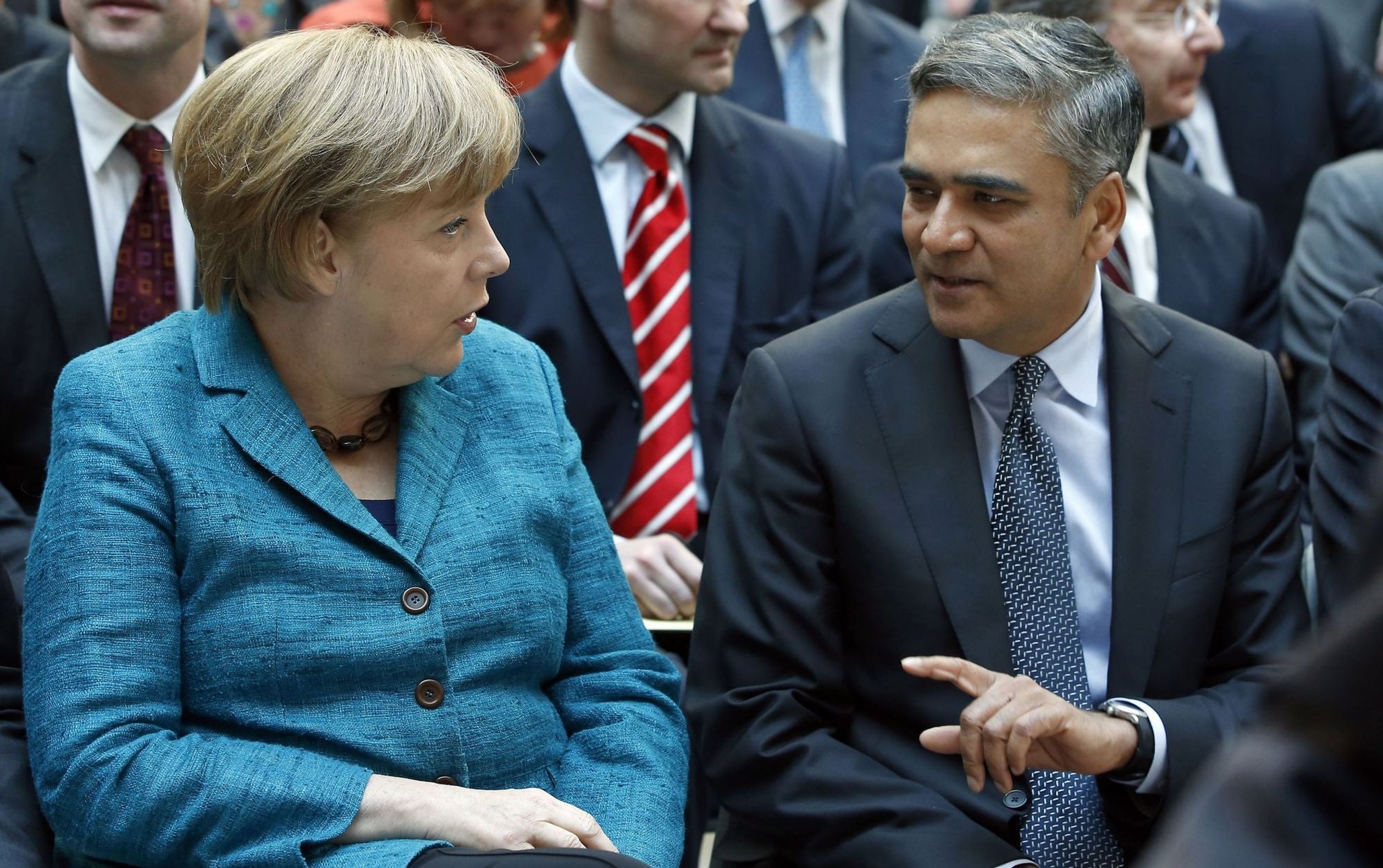The India-born banker who transformed Deutsche Bank is on his way out
In 2001, Warren Buffett, the world’s third richest man, made a prediction.


In 2001, Warren Buffett, the world’s third richest man, made a prediction.
“That boy will be running an investment bank one of these days,” the Oracle of Omaha said after lunching with a cousin of Ajit Jain, the CEO of the reinsurance division at Berkshire Hathaway, Buffett’s investment firm.
The cousin in question, back then, was a rising star in investment banking. But in a little over a decade, Anshuman Jain—or Anshu Jain, as he is better known—charted a meteoric ascent to become the co-CEO of Deutsche Bank in 2012.
Now, it has ended. On June 7, Jain and his co-CEO, Jürgen Fitschen, announced that they will step down from their positions. Their contracts were due to end only in March 2017.
“Over the course of two decades, Anshu has been instrumental in founding, and then growing, many of Deutsche Bank’s leading businesses,” Paul Achleitner, chairman of the supervisory board of Deutsche Bank, said in a statement.
“Anshu has earned a place in our bank’s history as an executive who helped to transform Deutsche Bank into the global leader, rooted in Germany, that it is today.”
Deutsche Bank had 2,814 branches worldwide with 98,138 employees in 2014. In the same year, it had net revenues of 31.9 billion euros.
Mathura Road to Manhattan
Born in Jaipur, Jain moved to New Delhi with his bureaucrat father when he was six, and later attended the Delhi Public School on Mathura Road. Much of his early years were spent in the Indian capital, except for a brief stay in Kabul after his father was transferred to Afghanistan.
Next, he went to study economics at Delhi’s elite Shri Ram College of Commerce, but Jain wasn’t your typical nerd. Two days before his final exams, a former schoolmate recalled, Jain went off to play cricket instead of cramming for his tests. Cricket remains a life-long passion for the banker.
Jain then went to business school at the University of Massachusetts in Amherst. Taught by the likes of Thomas Schneeweis, a leading academic in alternative investments such as futures, options and other derivatives, Jain quickly developed an interest in finance.
“We were having a revolution in financial innovation, and Anshu was a part of that,” Schneeweis said in 2006. ”Anshu showed entrepreneurial spirit from the get-go. He always wanted to explain things beyond what was in a textbook.”
Out of business school, Jain’s first job was at Kidder, Peabody & Co., a securities firm, in New York, where he worked in derivatives research. After leaving the firm in 1988, he joined Merrill Lynch. Jain spent seven years there, setting up and later running the global hedge fund coverage group. Thats’s also where he met his mentor, Edson Mitchell, a talented banker who spent 15 years at Merrill Lynch.
In 1995, Jain followed Mitchell, along with hundreds of bankers, to Deutsche Bank, where they formed the foundation of the German lender’s new investment banking division.
The rainmaker
When Mitchell died in a plane crash in 2000, Deutsche Bank was already on the way to transforming from a traditional lender into a global investment banking powerhouse: The investment banking unit was bringing in about two-thirds of the bank’s total profits.
Jain was asked to step into his mentor’s shoes, taking over as the head of debt. Four years later, he was given responsibility of debt, equity sales and trading at Deutsche Bank. And like his mentor, Jain’s performance was prolific: By 2010, when he became the boss of Deutsche Bank’s investment banking division, the unit was generating over 60% of the bank’s income. That year, Jain even earned more money than the then Deutsche Bank CEO Josef Ackermann.
“Anshu has done a fantastic job,” Laurence D. Fink, chief executive of BlackRock, the mutual fund, and a Deutsche Bank shareholder, told the New York Times in 2011. “He would make a very good chief executive at Deutsche or any other top financial institution.”
The next year, in 2012, Buffett was proven right: Jain became the co-CEO of Deutsche Bank.
But his journey to the corner office was more than just a talented and ambitious banker moving up at a global banking behemoth.

For one, Jain was the first non-native German speaker to have been appointed at the helm of a German institution. Although the India-born banker tried, he never quite attained the required mastery over the language. That, in turn, didn’t exactly help in making inroads within the ecosystem of German financiers and politicians that a Deutsche Bank CEO must navigate.
He also became co-CEO after the financial crisis roiled the good and the great of Wall Street, eroding trust in bank and bankers, and shrinking the appetite for risk. Deutsche Bank, of course, had weathered the storm better than most but the unease among key stakeholders persisted.
Endgame
The last few months haven’t been easy for 52-year-old Jain, who holds a British passport and has spent much of this career in London.
Not only did the bank not live up to analysts earnings estimates, it was also told to pay $2.5 billion to resolve accusations of rigging benchmark interest rates in April. A month later, in May, the Securities and Exchange Commission (SEC)—the US regulator—fined Deutsche Bank $55 million for hiding losses during the financial crisis.
It didn’t end there. Last week, the bank said it was conducting an internal probe into allegations of money laundering at its Russian unit.
Investors, meanwhile, have had their own questions about where Jain wanted to take the bank. One reason was that Deutsche Bank’s investment banking arm, once hugely profitable, is now shackled under tough regulations in the wake of the financial crisis.
If that wasn’t enough, it was also getting increasingly hard for Jain to strike a chord with the German investors and media because of his inability to speak the language.
At the bank’s annual general meeting this year, he spoke in English despite the law deeming that the speech must be in German. A German voice-over ensured that the legal requirements were met, according to Reuters, but shareholders weren’t exactly impressed.
A little over 60% of shareholders approved Jain and his co-CEO’s performance in the last year. In 2014, almost 90% backed them. Despite the sharp fall in popularity, such a sudden exit still wasn’t quite anticipated.
“It has been 20 years this month since I came to work at Deutsche Bank and it has been an extraordinary time,” Jain said in a statement. “I will be forever honored to have served here, and I am convinced that the future of the bank is bright and in very good hands.”
Those hands belong to 54-year-old John Cryan, a former executive at UBS and Singapore’s Temasek—and a German speaker.